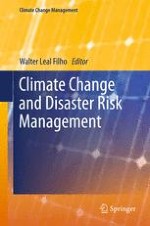2013 | OriginalPaper | Buchkapitel
44. Waterlogging Through Soil-Less Agriculture as a Climate Resilient Adaptation Option
verfasst von : Papon Kumar Dev
Erschienen in: Climate Change and Disaster Risk Management
Verlag: Springer Berlin Heidelberg
Aktivieren Sie unsere intelligente Suche, um passende Fachinhalte oder Patente zu finden.
Wählen Sie Textabschnitte aus um mit Künstlicher Intelligenz passenden Patente zu finden. powered by
Markieren Sie Textabschnitte, um KI-gestützt weitere passende Inhalte zu finden. powered by
